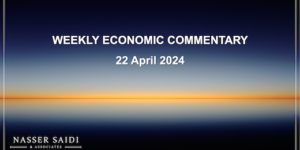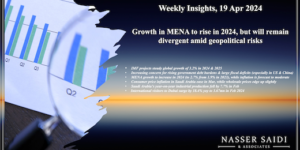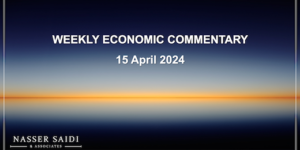Markets
Market euphoria post-Spain’s bailout faded as quickly as it set in but the Greek election results are likely to provide some respite to the markets, with the slim majority to the pro-bailout parties (Asian markets are already up a notch). Regional markets were mostly down last week, and the passing away of the Crown Prince sent Saudi shares lower, but recovered slightly yesterday. The Greek results have already sent the Euro to a one-month high, following last week’s disappointing run when the dollar had gained on its safe haven status. Gold had a good run in the build-up to the Greek elections, while oil continued to trade below $100.
Global Developments
Americas:
- US IP fell -0.1% mom in May due to a -0.4% drop in manufacturing, including a -1.5% decline in auto output. Non-auto manufacturing fell -0.3%.
- Retail sales in May were down by -0.2% mom in May (Apr: 0.2%), though the headline figure was supported by sales of cars and trucks. Excluding these, sales were down by -0.4%.
- Producer’s Price Index (PPI) was down by 1.0% mom in May (Apr: -0.2%), led by a drop of 4.3% in energy prices and 0.6% decline in food prices. Core PPI was up 0.2% (+0.2%). Lower energy prices also led to the 0.3% mom drop in CPI for May while core CPI was up 0.2% mom.
- US current account deficit increased to USD 137.3bn in Q1 (Q4: USD 118.7bn) – the highest since Q4 2008. Trade deficit, which accounted for most of the widening current account deficit, grew to USD 151bn during the same period.
- Initial unemployment claims increased by 6k to 386k, higher than expected, and constituted the fifth increase in the past six weeks. Firms are concerned that the US economy is affected by internal weakness and European contagion. Continuing claims fell 33,000 to 3.278mn.
Europe:
- The EU lent Spain up to EUR 100 bn for its bank rescue fund, more than is likely to be necessary in practice but enough to quell investors’ fears. But the bailout raised concerns on Spanish sovereign debt with Spanish yields rising while, in Greece, the run on the banking sector, before the elections, continued with close to EUR 100-500mn being withdrawn daily.
- EU industrial production fell in Apr by -0.8% mom (Mar: -0.1%), better than market expectations, but dragged down by German output, which declined by a whopping -2% mom (Mar: +0.9%). Portugal slumped -6.5% while Italy and Spain were down -1.9% and -0.7% respectively. Separately, France’s factory output declined by 0.7% mom in Apr.
- Italy, confirmed a decline in GDP growth by 0.8% qoq in Q1 on lower household consumption and exports.
- Euroland inflation eased to 2.4% yoy in May from 2.6% in Apr, in line with the preliminary estimates. A weak economy and falling oil prices should keep price pressures contained in coming months.
Asia and Pacific:
- Japan’s core machinery orders increased by 5.7% mom and 6.6% yoy in Apr (Mar: – 2.8% mom), helped by the rebuilding efforts after the tsunami.
- Japan’s seasonally adjusted consumer confidence nudged higher to 40.7 in May, from April’s 40, despite labour shedding, a 10% decline in the Nikkei, an appreciating yen, and bad news from Europe.
- IMF, in its latest Article IV on Japan, urged the nation to “address the longstanding challenges of high public debt” while stressing that its reconstruction efforts would drive economic recovery – GDP growth is forecast at 2.0% in 2012.
- Hong Kong should consider linking its currency to the Renminbi, not the USD, according to Joseph Yam, former head of the HK Monetary Authority.
- China’s money supply grew 13.2% yoy in May (Apr: 12.8%) while in Japan, M2 grew by 2.3% in May (Apr: 2.6%), the slowest pace in three years.
- Chinese banks issued more than RMB 793.2bn in fresh loans in May, from RMB 682bn in Apr (16.3% mom growth) as a result of monetary easing and, crucially, the government’s swift approval of new investment projects (the Finance Ministry reported a 22% yoy increase in fiscal spending during Jan-May). CNY deposits meanwhile grew by RMB 1.22trillion in May.
- Singapore’s non-oil exports increased 3.2% yoy in May (Apr: 1.7%) supported by a recovery in electronics (+ 3.9%) and pharmaceuticals (+0.3%).
- India’s industrial output grew by 0.1% yoy in Apr (Mar: -3.2%), within which mining fell 3.1% while manufacturing rose by 0.1% and electricity output grew 4.6%. However, the Central Bank did not ease and kept rates on hold at its meeting today in view of rising inflationary pressures, with the wholesale price index registering 7.55% in May (Apr: 7.23%) and food price inflation climbing to 10.74% (10.49%).
Bottom line: Despite the recapitalization of the Spanish banks, the interbank market in Europe continues to be dysfunctional with Southern European banks shut out from access to credit and completely reliant on ECB liquidity. Given the fact that one Euro deposited in a Greek bank (or in an Italian bank for that matter) is not equivalent to a Euro deposited in a German bank, Euroland’s financial sector has been in practice broken up into national pockets of liquidity which a capital flight is contributing to dry up. With the victory of pro-Euro New Democracy party in Greece, a Eurozone exit seems implausible. The G20 Summit has already seen some emerging markets (including China, Indonesia) calling for urgent measures to tackle the European debt crisis.
Regional Developments
- The Muslim Brotherhood claimed victory in Egypt’s presidential elections, though a spokesperson for the ex-Premier Shafik stated that only half the votes were counted and it is too early to call. Official results will be released on June 21. Meanwhile, the supreme constitutional court’s decision on Parliament dismissal meant that martial law was effectively in force, also giving significant power to the military including preparation of the budget and to form a committee to write the new constitution.
- Egypt‘s balance of payments deficit widened in the past 3 quarters to a deficit of USD 11.2bn compared to USD 5.5bn in the same period last year while the current-account deficit widened to USD 6.4bn from USD 4.7bn over the same period. Tourism revenues reached USD 2bn, a 11% yoy growth from a disastrously low base in 2011.
- Egypt‘s core inflation (excluding volatile and subsidized items) slowed to 7.2% yoy in May (Apr: 8.4%).
- Qatar is expected to provide USD 1.25bn to the Gulf Development Fund, from which energy, health and transportation development projects in Jordan will be financed, according to the Minister of Planning and International Cooperation of Jordan.
- The price of 90-octane gasoline in Jordan increased from JD 0.62 per litre to JD 0.70 (USD 1.01). This measure will improve country’s budget sustainability, as the subsidies will reduce by around JD 140mn, an estimate provided by the Jordan Times citing local sources.
- Kuwait‘s minister for social affairs and labour resigned, being the second cabinet member to quit in less than a month under pressure from opposition.
- GDP growth estimate for 2012 in Lebanon was reviewed by the EIU to 2.9% from the previous 3.2%, as the country’s tourism sector is expected to suffer from the security situation in Syria.
- Oman Arab Bank, the banking arm of Oman International Development and Investment Co informed the Capital Market Authority that it delayed its IPO until Sep. The offer comprised 290 million shares with Ominvest offloading 243.6 million shares, or 21% of the company’s share capital.
- Oman will issue sovereign bonds for OMR 100mn (USD 259mn) to finance this year’s budget deficit estimated at OMR 1.2bn, according to the central bank governor. The securities bearing 10-year maturity are expected to have annual coupon rate at 5.5%.
- The governor of Qatar Central Bank reaffirmed that the peg to the US dollar is relevant under existing conditions, despite some challenges of limited policy flexibility. While periods of US dollar depreciation are associated with inflationary pressure through higher import prices, the benefits of the pegged exchange rate outweigh the costs, according to the governor cited by Zawya Dow Jones.
- Saudi’s Crown Prince Nayef passed away, opening a search for a successor.
- SABIC announced it intends to repay an SAR 8 bn (USD 2.13bn) Sukuk before maturity, from internal cash balances.
- Saudi Arabia’s non-oil exports increased by 27% yoy in Apr 2012 to reach SAR 16.2bn, while imports grew by 9% yoy to total SAR 44.1bn,
- Bahrain is expected to issue sovereign bonds nominated in USD for a total of USD 1.25bn, as reported in the Financial Times referring to market sources, who believe that excess liquidity in the regional markets may support demand for the securities.
- Turkey is negotiating long-term oil purchases with Saudi Arabia, in an effort to diversify its supply, according to the country’s energy minister.
- According to the results of regular survey conducted by the Turkish statistical agency, unemployment in Feb-Apr 2012 was 9.9%, which is 0.9% lower than in the same period of 2011.
- The budget surplus in Turkey in May 2012 reached TRL 4.6bn (+61.8% yoy), after a deficit of TRL 432mn in the period Jan-May 2012. Current account deficit in Jan-Apr 2012 was USD 21.2bn, which is USD 8.06bn lower than over the same period of 2011.
- At the meeting on June 14th, OPEC members agreed to leave its oil production ceiling at 30mn bpd, however no individual country quotas were disclosed in the official statement. This means that current oil output has to be collectively reduced by 1.6mn bpd. Overall, the last OPEC meeting took place amid strong tensions among the members of the organization instigated by external players, and it may be difficult to adhere to the “agreed” plan. Also, the OPEC members could not agree on the new secretary general, indicative of internal non-alignment.
UAE Focus
- The UAE public finances recorded a surplus of 2.9% of GDP in 2011 after two years of deficits as robust oil income offset an increase in government spending, according to the International Monetary Fund.
- DIFC Investments repaid its 2012 Sukuk of USD 1.25bn as planned at maturity. Emirates airlines also repaid its USD 550mn Sukuk, given its strong cash balance.
- To promote development of the SME sector, the UAE is planning to introduce new laws – to simplify and streamline bank loans and help regulate this sector – later this year.
- New ownership rules were announced by the UAE regulator: any investor, planning to acquire a shareholding in a listed company of 30% or greater, needs to inform the market beforehand and this can potentially be rejected by the market and/or the regulator if contrary to national interests.
- Dubai Jebel Ali Free Zone priced a USD 650ml 7-year Sukuk, at a 7% profit rate, towards the lower end of guidance thanks to strong investor demand. A senior government official attributed this and other recent repayments/ refinancing as “an indication on their sound financial planning, strong status and commitment towards their investors and creditors” and a major vote of confidence on Dubai’s economy.
- The second edition of fDi Magazine’s ranking of global free zones has conferred Dubai Airport Free Zone the title of Global Free Zone of the Future 2012/13. The DIFC has been placed second, with China-based Shanghai Waigaoqiao Free Trade Zone coming in at third.
- A Mastercard survey has ranked Dubai at 8 in its “Worldwide Index of Global Destination Cities” for 2012. Forecasts are that number of tourists would increase by 15.3% to 8.8mn (with visitors from London topping the list) and spending would be up 18.5% to USD 8.8mn.
- The UAE’s oil minister stated that about 200k bpd would be added to current oil production by the end of the year.





